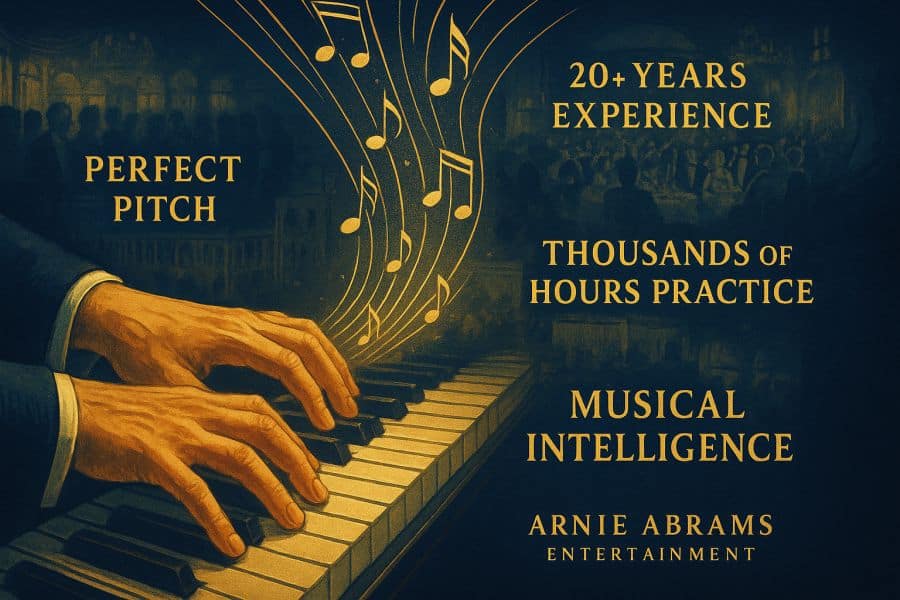A Look Inside the Life, Preparation, and Professional Realities of a Master Pianist
Many event planners struggle to understand what goes on behind a pianist’s polished performance. Professional pianists like Arnie Abrams spend years mastering their craft, often practicing hours daily to perfect their repertoire spanning classical, jazz, and contemporary styles.
This blog will reveal what this seasoned New Jersey pianist wishes clients knew about his work, from repertoire selection to venue requirements. The truth might surprise you.
The Hidden Truth Behind Professional Piano
“What guests see as ‘natural talent’ represents years of dedication and thousands of hours of practice.” – Arnie Abrams
Key Takeaways
- Professional pianists like Arnie practice daily, even after 20+ years of performing, with each performance representing thousands of hours of preparation.
- Pianists need weeks or months to prepare new pieces properly, not days, making last-minute repertoire requests difficult to fulfill with quality.
- Every venue and piano presents unique challenges, requiring pianists to test the instrument hours before performing to adjust their technique accordingly.
- The myth of “natural talent” harms pianists, as their skills come from years of dedicated practice rather than effortless ability.
- Clear communication about event details, proper acknowledgment of the pianist’s work, and respect for their expertise creates the best client-pianist relationships.
The Realities of a Pianist’s Life
Professional pianists practice for thousands of hours to master each piece they perform. Behind every flawless wedding ceremony or corporate event lies years of daily training, physical strain, and mental focus that most clients never see.
The hours of practice behind every performance
Most clients see only the final product of Arnie’s work at their cocktail party or holiday celebration. Behind each performance lies thousands of hours of dedicated practice. Even after 20+ years in the business, Arnie maintains a daily practice routine to keep his skills sharp across multiple musical genres.
This dedication drives pianists to repeat passages hundreds of times until they flow naturally. The physical demands match those of athletes, with finger strength, wrist flexibility, and core stability all requiring constant maintenance.
Every note you hear at your Bar Mitzvah or anniversary celebration represents years of training and preparation. Pianists develop superior problem-solving skills through this intense practice regime. The music that seems effortless during your milestone celebration has been refined through countless hours of technical drills and musical study.
What Clients See vs. Reality
What Clients See
- ⏱️ 2-3 hour performance
- 🎵 “Effortless” playing
- 🎹 Beautiful music
- 😊 Smiling performer
- 🎊 Perfect atmosphere
The Reality
- 📚 20+ years of daily practice
- 💪 Physical conditioning like an athlete
- 🧠 Thousands of memorized pieces
- 🎛️ Venue acoustics adaptation
- 🎭 Mental focus under pressure
Every “effortless” performance represents years of dedicated preparation
Arnie’s ability to play by ear and take requests on the spot comes from this extensive background preparation. Your guests enjoy the beautiful sounds without seeing the years of dedication that made them possible.
The physical and mental demands of piano playing
Professional pianists train their bodies like athletes. Each performance demands perfect finger control, proper posture, and core strength to sustain hours at the keyboard. Arnie’s high-energy ‘Harlem Stride’ style requires exceptional physical conditioning that he maintains through daily practice sessions.
The physical toll includes potential injuries such as tendonitis and carpal tunnel syndrome, which many musicians battle silently throughout their careers.
Mental demands match the physical challenges in intensity. Pianists memorize thousands of notes for performances, requiring deep focus and emotional control. Arnie’s perfect pitch and ability to pick up songs quickly by ear represents years of developing what musicians call “musical intelligence” – the ability to process complex musical structures while performing.
This mental workout explains why piano players develop superior problem-solving and reasoning skills. The pressure to perform flawlessly creates significant stress, especially when adapting to different venues and varying acoustic conditions across New Jersey, NYC, and Philadelphia.
“The piano is an emotional translator between performer and audience, making it perfect for milestone celebrations.” – Arnie Abrams
What Goes Into Preparing for a Performance
Professional pianists spend weeks or months preparing for performances. They must master every note while planning for acoustics, lighting, and the specific piano they will play at each wedding venue or event location.
Selecting the right repertoire
Arnie spends considerable time choosing music that fits each event perfectly. For luxury events, repertoire selection demands careful thought about the venue, audience, and occasion.
Unlike performers who randomly pick pieces, Arnie matches music to the emotional tone of your gathering. A birthday celebration might call for upbeat contemporary hits, while an elegant dinner party might benefit from classical selections or smooth jazz standards.
Piano repertoire spans centuries, from Bach’s intricate counterpoint to modern pop interpretations. Your pianist needs advance notice to prepare these works properly, especially pieces outside their regular rotation.
Many clients don’t realize that even accomplished performers like Arnie practice specific pieces extensively before performing them. His versatile repertoire spanning classical, jazz, contemporary, and pop requires constant maintenance and preparation time.
Understanding the nuances of the venue and instrument
Every venue presents unique acoustic challenges for pianists. Concert halls echo differently than hotel ballrooms, and outdoor Jersey Shore weddings absorb sound in ways that can surprise even seasoned performers.
Professional pianists must test the piano hours before your event starts, adjusting their touch and dynamics to match the space. Arnie adapts his playing style based on venue acoustics, a skill developed through his 20+ years of experience performing across the tri-state area.
“Every piano has its own personality. You must know which keys to press to capture the audience’s attention.”
The instrument itself demands equal attention. No two pianos play alike – each has its own action, touch sensitivity, and tonal qualities. A Steinway grand piano requires different techniques than a Yamaha or digital keyboard.
Pianists need time to bond with the specific instrument at your event, testing pedal response and key resistance. This preparation ensures your guests experience the full emotional range of your chosen music, played with the precision and passion that transforms a good event into an unforgettable one.
Managing pre-performance nerves
Professional pianists develop specific rituals to manage performance anxiety. Arnie has developed techniques over his 20+ year career to stay calm and focused before important performances.
The physical demands of piano playing require both mental and physical preparation. Experienced pianists practice visualization techniques, imagining themselves playing flawlessly on the actual venue’s piano.
This helps them adapt to different acoustic environments, whether playing at an intimate senior center event or a grand wedding celebration.
Pre-performance preparation affects even experienced professionals. Event planners should create a quiet space for pianists to gather their thoughts 30-45 minutes before playing.
This small courtesy makes a huge difference in performance quality. Arnie’s perfectionist approach means he needs this time to focus and prepare for the demands ahead.
Your guests will notice the difference when the musician steps confidently to the keyboard, ready to transform your event through their artistry.
Misconceptions About Pianists
Many people see pianists as gifted artists who simply sit down and play masterpieces without effort. The truth reveals a different story – behind every flawless performance lies years of daily practice, technical work, and deep musical study.
The myth of effortless talent
Behind every flawless piano performance lies thousands of hours of practice. What guests see as “natural talent” at your events represents years of dedication and hard work.
Arnie’s ability to play by ear and take requests comes from starting piano at age 5 and maintaining a practice routine for over two decades. His perfect pitch wasn’t just a gift – it was developed and refined through consistent training and musical education in New Haven and Buffalo, NY.
The idea that pianists simply sit down and play Chopin or contemporary hits perfectly is a harmful myth. Piano repertoire requires intense preparation, not just innate ability. Even musical prodigies spend countless hours mastering their craft.
Arnie’s journey from studying classical, pop, and jazz piano to becoming a sought-after entertainer across New Jersey, NYC, and Philadelphia required dedicated effort and continuous learning.
Understanding these realities helps event planners set proper expectations about what goes into preparing for a performance.
The misconception that pianists play “for fun” only
Many clients fail to grasp that piano performance requires intense dedication rather than casual enjoyment. Professional entertainers like Arnie invest thousands of hours in practice to master pieces spanning multiple genres and styles.
The path to mastery demands what Arnie demonstrates: technical skill paired with perfectionism in performance. A pianist’s life includes daily practice, memorization work, and physical conditioning that most audiences never witness.
Event planners often request complex pieces without understanding the preparation involved. Each performance requires precise control and adaptation to different instruments and acoustic conditions.
Far from casual entertainment, piano playing develops superior problem-solving skills and musical intelligence through years of training. Arnie didn’t achieve his reputation as an award-winning pianist through casual playing – he built his career through rigorous study and technical mastery that deserves proper compensation and respect.
Challenges Pianists Face with Clients
Professional pianists often face a gap between client expectations and musical realities. Clients request songs that sound simple but require complex technical skills, or expect unlimited repertoire without understanding the hours of preparation needed.
Unrealistic expectations for repertoire requests
Clients often request complex classical pieces or intricate jazz arrangements with just days of notice. These works demand extensive practice time from even seasoned pianists like Arnie.
Professional performers might make these works look effortless, but behind each performance lies countless hours of preparation and technical refinement. Most pianists develop high standards in their craft, spending considerable time mastering the nuances of different musical styles.
Many event planners assume pianists can play any song on demand without preparation. The reality differs greatly from this assumption. Each piano has unique characteristics that require adjustment time.
A pianist needs to understand the venue acoustics and instrument characteristics before performing. Clear communication about repertoire expectations at least 4-6 weeks before an event allows the musician to prepare properly and deliver the musical experience your clients truly desire.
Underestimating the time needed for preparation
Beyond unrealistic song requests, many clients fail to grasp how much time pianists need to prepare. Professional entertainers invest considerable time perfecting each piece – a fact often overlooked when clients make last-minute requests.
Like other accomplished musicians, Arnie needs proper time to develop the muscle memory and technical precision each performance demands.
Event planners should note that learning new music isn’t simply reading notes. Pianists must internalize complex patterns and adapt them to different performance settings. Great pianists didn’t achieve their mastery overnight.
The high standards that define professional entertainers require adequate preparation time. Providing your pianist with repertoire requests weeks before your event ensures they’ll deliver the polished performance your clients expect.
Proper Timeline for Repertoire Preparation
6+ Weeks Before
Initial repertoire discussion and song selection
4-5 Weeks Before
Intensive practice and memorization begins
2-3 Weeks Before
Venue visit and instrument testing
1 Week Before
Final practice and performance preparation
Event Day
Flawless performance delivered!
⚠️ Last-minute requests compromise quality and may not be possible
Common misunderstandings about fees and professionalism
Many clients fail to grasp that a pianist’s fee reflects years of training and thousands of practice hours. Professional entertainers like Arnie invest in their craft, developing superior musical and communication skills through decades of experience.
The price tag includes not just performance time but also preparation, travel, and the expertise needed to adapt to different venues and instruments across New Jersey, NYC, and Philadelphia.
Clients often expect pianists to play any requested song perfectly on the spot, overlooking the reality that musicians must study each piece carefully. Each piano has unique characteristics that demand adjustment and preparation time.
Clear communication about fees and expectations helps build the professional relationship needed for successful events. This foundation creates better experiences for everyone involved.
How Clients Can Better Support Pianists
Clients who respect a pianist’s expertise, communicate clearly, and value their time create the foundation for successful musical collaborations that result in memorable events.
How to Support Your Pianist for Best Results
Clear Communication
- ✓ Discuss repertoire 6+ weeks ahead
- ✓ Provide complete venue details
- ✓ Share audience demographics
- ✓ Specify timing and breaks
Show Respect
- ✓ Value their 20+ years expertise
- ✓ Offer fair compensation
- ✓ Allow instrument testing time
- ✓ Trust their musical judgment
Proper Recognition
- ✓ Include in event materials
- ✓ Introduce properly to guests
- ✓ Thank publicly during event
- ✓ Share on social media
💡 Pro Tip
The best client relationships form when you treat pianists as valued artists, not just background entertainment. This respect leads to performances that truly elevate your event.
Clear and early communication
Professional pianists need your event details as early as possible. Experienced performers like Arnie require advance notice to prepare specific pieces for your event. The right music creates the perfect atmosphere, but pianists can’t deliver their best work with last-minute requests.
Early communication allows them to match their repertoire to your event’s mood and audience preferences. Professional musicians maintain practice routines that require planning and preparation time.
Event planners should provide complete information about the venue, piano type, and audience expectations. Different instruments produce different sounds, and pianists must adjust their technique accordingly.
Your guests will notice the difference between rushed and well-prepared performances. Clear details about timing, breaks, and special requests help pianists deliver the musical excellence your clients expect.
For the best results, contact Arnie Abrams Entertainment well in advance of your event date.
Respect for the pianist’s expertise and time
Professional pianists invest thousands of hours mastering their craft. Event planners must respect this expertise by giving artists proper notice for repertoire requests.
Many clients don’t realize that pianists need time to prepare pieces, especially works outside their regular rotation. A pianist’s time carries real value – they’ve developed superior problem-solving and reasoning skills through years of practice and performance experience.
Pianists bring more than music to your event; they bring versatility and professionalism that elevates the atmosphere. Each performance requires mental and physical preparation, not just showing up and playing.
The best client relationships form when planners acknowledge this dedication by offering fair compensation, providing accurate event details, and allowing adequate rehearsal time with the instrument.
Your guests will notice the difference when a pianist performs at their best rather than being rushed or undervalued.
Proper acknowledgment of the pianist’s work
Respect for a pianist’s time extends to proper recognition of their artistry. Event planners should credit pianists in all event materials, including programs and social media posts.
Many clients fail to realize that professional entertainers spend considerable time perfecting their craft. Each performance represents years of dedication and what Arnie demonstrates through his “high-energy” performances.
Public acknowledgment matters because piano playing demands both physical and mental excellence. A pianist handles complex musical arrangements while adapting to different venues and audience preferences.
Event professionals can show respect by introducing the pianist properly to guests and thanking them publicly. This recognition honors the problem-solving and communication skills that pianists develop through their rigorous training and experience.
Life Lessons Pianists Learn Through Music
Music teaches pianists to face challenges and persevere through difficult passages. Great entertainers like Arnie learn that true progress happens through consistent effort, not just talent.
Perseverance and determination
Professional pianists embody true dedication behind each performance. They practice for thousands of hours, often repeating the same passage multiple times to master a single phrase from classical pieces or contemporary arrangements.
This dedication shapes the high standards that event planners should respect when booking entertainment. Accomplished musicians like Arnie didn’t achieve success through natural talent alone but through consistent daily practice that built their musical intelligence and technical skill.
The piano demands physical and mental stamina few other professions require. Each performance involves managing complex musical arrangements while reading the room and expressing appropriate emotions for the occasion.
This creates professionals who solve problems quickly and make split-second decisions under pressure. Event coordinators who understand this training process gain better appreciation for why repertoire requests need advance notice and why different pianos require specific preparation time.
The power of emotional expression
Professional pianists transform feelings into music that moves your guests. Accomplished entertainers master this art through years of practice, not just natural ability.
Pianists tap into joy, celebration, romance, and wonder through their fingertips, creating moments your clients will remember long after the event ends. The piano serves as an emotional translator between performer and audience, making it perfect for milestone celebrations.
Event planners who understand this emotional dimension gain an edge. A pianist’s performance at your event does more than fill silence. It creates a mood, tells a story, and connects people across generations.
The right musical selection can highlight key moments during wedding ceremonies or private gatherings. Pianists develop superior communication skills through their art, allowing them to read a room and adjust their emotional expression to match the event’s needs.
Creating Multi-Generational Appeal
Piano music offers a unique power to bridge age gaps at events. Classical pieces create sophisticated atmospheres, while modern interpretations appeal to younger guests.
Professional pianists like Arnie develop this versatility through years of practice and musical experience. His repertoire includes classical, jazz, contemporary, and pop music, making him valuable for celebrations that span multiple generations.
Event planners should know that skilled pianists can craft programs that honor both tradition and current tastes. A versatile performer might pair classical selections with jazz influences or contemporary hits, creating a musical journey that grandparents and grandchildren enjoy equally.
The right pianist brings unlimited possibilities to your event, transforming a standard celebration into a multi-sensory experience where musical connections form across family lines.
Tips for Collaborating Successfully with Pianists
Clear communication forms the foundation of a great pianist-client partnership. Learn how to create a smooth working relationship with your pianist through practical steps that respect their craft.
Setting realistic expectations
Professional pianists need clients to understand what’s possible within their timeframe. Most event planners don’t realize that pianists spend considerable time mastering each piece, not minutes.
A pianist might need weeks to prepare specific classical or contemporary works requested at the last minute. Experienced musicians practice regularly to maintain their skills across multiple musical genres.
Discuss repertoire options early and trust your pianist’s musical intelligence about what works best for your event space. Different pianos sound unique in each venue, and pianists must adapt their touch accordingly.
Your pianist brings years of training to your event, not just performance skills. Many clients mistake natural talent for what actually requires dedicated practice and technical skill.
Great entertainers achieve their “effortless” performances through thousands of hours of preparation and experience.
Providing detailed event information
Clear information leads to flawless performances. Professional pianists need specific details about your event to deliver their best work. The venue size, acoustics, and available instruments directly impact repertoire choices.
Accomplished musicians like Arnie prepare differently for intimate birthday celebrations versus grand wedding receptions. They must know if they’ll play on an acoustic or digital piano, as each requires different techniques.
Event timing details matter greatly to piano performers. A pianist needs to know exact performance duration, breaks, and whether background or featured music is expected. Professional entertainers need this information weeks ahead to practice properly.
Piano preparation involves more than repetitive practice. The pianist must understand your guest demographics to select music that creates multi-generational appeal. This musical intelligence helps them build a repertoire that resonates with your event’s atmosphere.
Building a respectful and professional relationship
Professional pianists thrive in partnerships built on mutual respect. Experienced performers expect clear boundaries and professional courtesy from event planners.
Respect starts with valuing their expertise – pianists spend thousands of hours perfecting their craft, much like the dedication Arnie has shown throughout his 20+ year career. The best client relationships acknowledge this mastery and treat pianists as valued artists rather than background entertainment.
A strong professional bond requires trust in the pianist’s musical intelligence. Event specialists who provide detailed information while trusting repertoire choices create ideal working conditions.
Pianists develop superior problem-solving and communication skills through their training, making them excellent collaborators when given proper respect. This foundation of respect leads to performances that truly connect with audiences across generations.
Conclusion
Pianists bring years of training to each performance, yet many clients miss this hidden work. Clear discussions about music choices, venue needs, and fair compensation build better working relationships.
Respect for a pianist’s craft leads to more moving musical moments at your events. The next time you hire a pianist, ask about their journey with different musical styles, and watch their enthusiasm for their art form shine through.
Your interest in their craft will create a richer experience for everyone at your special occasion.
For exceptional piano entertainment that understands the dedication behind every performance, contact Arnie Abrams Entertainment at (732) 995-1082 or visit ArnieAbramsPianist.com.
Experience Professional Piano Artistry
Ready to work with a pianist who understands the dedication behind every performance? Arnie Abrams brings 20+ years of expertise to your special event.
“Your interest in their craft will create a richer experience for everyone at your special occasion.”
FAQs
How much daily practice do professional pianists like Arnie Abrams maintain?
Most professional pianists practice regularly to maintain their skills across different musical genres. Arnie maintains a consistent practice routine even after 20+ years of performing, focusing on quality work rather than just repetition.
Is an acoustic piano better than a keyboard for events?
Acoustic pianos offer authentic touch and tone that keyboards cannot fully replicate. However, quality digital pianos work well for many venues and outdoor events where acoustic instruments aren’t practical.
What preparation methods do pianists use to master difficult pieces?
Slow practice remains the gold standard among professionals. Breaking complex passages into small sections builds muscle memory and musical understanding. Professional pianists focus on understanding the musical structure before increasing tempo.
How important is it to discuss repertoire in advance?
Understanding your event’s needs and musical preferences provides crucial context for song selection. Knowledge of your audience demographics and event style helps pianists deliver authentic performances that match your celebration’s atmosphere.
What separates good pianists from great ones?
Great pianists combine technical skill with deep musical intelligence and the ability to connect with audiences. The difference often lies in personal expression, versatility across musical genres, and the ability to adapt to different venues and occasions rather than just perfect execution.





